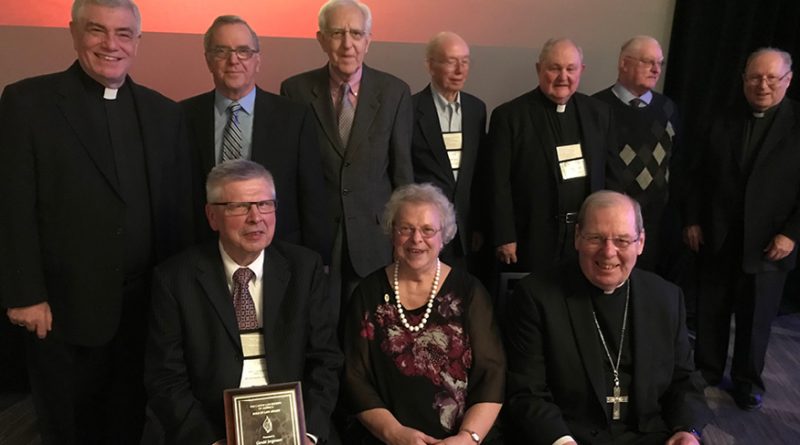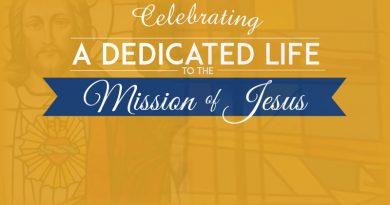Deacon psychologist recognized for work as canon lawyer
By Dan Russo
Witness Editor
DUBUQUE — Gerald Jorgensen is a Catholic triple threat — someone who is adept at serving God in three different fields of activity. Aside from being an ordained permanent deacon, he is also a licensed psychologist and a canon lawyer.
The 71-year-old was recently recognized on a national level for his contributions to the practice of church law. On Oct. 10, Deacon Jorgensen was given the Canon Law Society of America’s Role of Law Award at its 80th annual convention in Phoenix, Arizona. He is the first permanent deacon and first married person to receive the honor in the organization’s history.
“I was shocked,” said the deacon of his reaction to being selected for the society’s highest honor. “I’d actually served on the (society’s) board of governors for several years in different capacities and was involved in choosing recipients. I just never saw myself receiving it. I’m grateful to the society and my family and still somewhat surprised.”
The canon law society has over 1,300 members in the United States, Canada and other countries.
The honor is given to a member who embodies a pastoral attitude, is committed to research and study, has participated in the development of law, responds to needs for assistance, and facilitates dialogue and the interchange of ideas within the society. One winner is chosen each year. Recipients can’t currently be on the board of governors, according to society rules.
Deacon Jorgensen is currently the consulting psychologist for the Archdiocese of Dubuque, where he also serves as a judge in the Metropolitan Tribunal, the church equivalent to the local court. The tribunal also handles appeals cases from other dioceses in the region. Deacon Jorgensen has served as a canon lawyer in various matters in other tribunals. He does ministry work at the Church of the Resurrection and is on the medical staff at Mercy Hospital, both in Dubuque. Despite wearing many hats, the father of three and husband to wife Mary sees all his duties in psychology and canon law, which sometimes overlap, as part of his vocation as a deacon. In his work, he always puts faith at the forefront.
“When I’m a judge I’m supposed to arrive at moral certitude,” said the deacon. “Sometimes it’s easier than others. Many times it takes spending time in prayer thinking about this.”
As a young man, Deacon Jorgensen attended seminary at Loras College in Dubuque, originally considering a call to the priesthood. Once he realized this wasn’t his vocation, he switched his focus to psychology, earning a doctorate from the University of Colorado in 1973. In 1974, the permanent diaconate was restored in the archdiocese. Deacon Jorgensen was part of the first diaconate class, being ordained at age 32. The archbishop at the time was required to obtain a dispensation to allow this, since the usual minimum age for permanent deacons is 35.
Deacon Jorgensen served as a counselor, faculty member and administrator at Loras. His first experiences with the church legal system were while serving as a psychological expert and assessor for the tribunal.
In 1993, he began working for the archdiocese full-time. In his 40s, the deacon studied canon law at Catholic University’s summer program, graduating in 1998.
“I just always felt a call to be of service and to be of service to the church,” said Deacon Jorgensen. “I was always involved with the church and Catholic education.”
As a canon lawyer and judge, the deacon has dealt with marriage annulments, penal cases and property disputes. The vast majority of the tribunal’s cases, an average of about 130-150 a year, deal with annulments, according to Deacon Jorgensen.
The deacon continues to provide psychological services when necessary for the archdiocese, such as evaluations for applicants to the seminary and permanent diaconate. Psychology can also play a role in some annulment cases. In his work over the years, Deacon Jorgensen has done research and spoken on how psychology fits into efforts to interpret church law.
After accepting his award, the deacon focused his acceptance speech on the current sexual abuse crisis the church is facing.
“I talked about what I saw that we as individuals can do and what we as canonists might lobby for,” he said. “Individuals need to pray and recognize the call to holiness as Pope Francis has said earlier, which the archbishop (Archbishop Michael Jackels) has repeated in his responses. We need to pay attention to the victims and be concerned about them. At the same time, we must be concerned about the rights of those that are accused.”
In his speech, Deacon Jorgensen mentioned the multiple abuse investigations happening in the U.S. and worldwide and reflected on how they might impact canon law.
“From a canonical standpoint it can’t just be simple reform, there needs to be radical reform,” he said.
Deacon Jorgensen believes strongly in the importance of canon law in promoting justice and order in the church. The Catholic Church’s legal system, he said, is rooted in the tradition of Jewish law and has developed over centuries based on a Roman-style “inquisitorial model.”
“The church’s legal system is the longest continuously active legal system in the Western world,” he said.
Deacon Jorgensen said he was thankful for the award and he hopes to continue serving in the church in the tribunal and in others ways. “I’m humbled by it,” he said of the recognition.
Deacon Gerald Jorgensen (front row, far left) is seated with the last three recipients of the Role of Law Award, including Sister Victoria Vondenberger, RSM, the 2017 recipient, and Bishop Robert Deeley of Portland, Maine, the 2016 recipient, on Oct. 10 at the Canon Law Society of America’s 2018 Convention. (Photo by Father Brian Dellaert)




